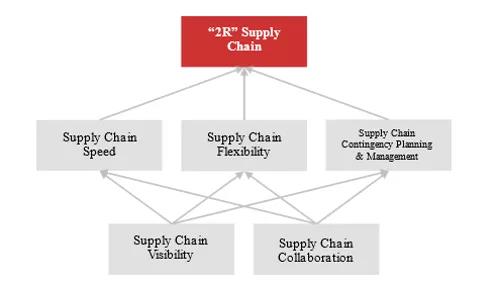How to Build "2R" Supply Chains in a Global Supply Network?
Global EMBA Programme Quick Menu: Application Process; Class Profile; Online Sharing Sessions; Alumni Panel Discussion
The world economy is under great pressure due to the outbreak of COVID-19, and the situation may turn out to be a big wake up call for global supply chain management. Over the past three decades, despite some setbacks, supply chains in most industries have seen increasing global divisions of labor, which also explains why COVID-19 is having such a great impact on global supply chains. What changes will happen in global supply chains after COVID-19? And how should we respond to the changes?
Recently Zhao Xiande, CEIBS Professor of Operations and Supply Chain Management and a leading expert in the field, gave an online sharing session on supply chain management under COVID-19. Three CEIBS alumni, all experienced supply chain executives, from SF Express, Whirlpool and Maersk respectively, were invited as panelists for the panel discussion, to share some best practices in coping with COVID-19 as well as their insights into supply chain strategy. About 400 executives attended the session, exploring critical issues such as innovative supply chain management practices in responding to the COVID-19 crisis, adaption mechanisms for supply chain strategies and capabilities, and the development trends in supply chain for a post COVID-19 environment.

Click here to watch the webinar recording online
Author / Zhao Xiande (Professor of Operations and Supply Chain Management at CEIBS), Wang Liang (Research fellow at CEIBS)
Highly integrated global supply chains: the ripple effect under COVID-19
In the context of economic globalization, global industrial chains have become more diversified and integrated. Today a supply chain may involve dozens of countries and hundreds of companies, from raw materials to parts and components, to work in process and eventually to finished goods. Such structures may lead to what we call the “ripple effect”, i.e. a disruption, rather than remaining localized or being limited to one part of the supply chain, spreads and impacts the operations and performance of the whole supply chain.
Ripple effect describes the propagation of amplified disruptions in supply chains. i.e., the disruption of one part (Part A) of the supply chain causes the disruption of the other parts, which in turn hinders the recovery of Part A, and ultimately the whole supply chain gets bogged down.
Take the automotive industry as an example. Since the outbreak of COVID-19 in early 2020, the ripple effect has diffused from China to global supply chains in three main stages.
Stage 1
Wuhan’s lockdown forced auto companies and auto parts suppliers in the city to shut down their manufacturing facilities; auto companies across China delayed restarting production after the Lunar New Year holiday due to shortages of supply.
Stage 2
Overseas auto companies and auto parts suppliers were affected by the disruptions in China.
Stage 3
As COVID-19 turned into a pandemic, major automotive industry clusters in Europe, North America, Japan and South Korea were seriously disrupted, which in turn hindered the automotive industry in China from fully resuming production, and the whole chain got bogged down.
All parts of the supply chain are bound together for better or worse. No one is an island. In the context of a global division of labor, how can companies learn from the COVID-19 crisis and improve their risk management by building a flexible, reliable and shockproof supply network?
From operational thinking to strategic thinking: mindset shift is a prerequisite of supply chain restructuring
Over the past decades, many executives did not attach enough importance to supply chain management, considering it to be just an operational matter. Now more and more executives are changing their minds and beginning to reconsider the role of the supply chain in building a sustainable competitive advantage. The supply chain is not just an operational issue anymore, but an important part of strategy and business model innovation. This mindset shift is a prerequisite for successful supply chain restructuring.
One lesson we can learn from the COVID-19 crisis is that, in supply chain design, we should consider not only quality and efficiency (as we did in the past), but also risk management. A supply chain with sufficient risk management capability (i.e. the ability to address both demand and supply uncertainties) should be a “2R” supply chain - responsive and resilient. Specifically, a “2R” supply chain is able to respond quickly and accurately to the fast changing customer demands and market needs, and to recover quickly from the disruptions due to the impact of external disasters, maintaining operations continuity to the greatest extent possible.
Five capability modules for a “2R” Supply Chain
Successful cases of supply chain management show that there are five capability modules that companies should build if they want to make their supply chains responsive and resilient, namely speed, flexibility, contingency planning and management, visibility, and collaboration.
Supply chain visibility is the ability to ensure that all stakeholders along the supply chain have access to timely and accurate information critical for their operations and thus can use the information to create business value. It is not just about technology. Many companies have the technical capability to establish internal connectivity, but find it difficult to have an end-to-end connected supply chain when it comes to inter-organisational connections. This highlights the importance of the “collaboration” module.
Supply chain collaboration refers to close cooperation of all chain members driven by a shared goal in order to create more value than they could do individually. Since a company cannot do everything on its own, it needs to cooperate with others and leverage their resources and capabilities. How well it can do this largely depends on the effectiveness of supply chain collaboration.
Supply chain speed indicates the flow time of a supply chain, which can be improved by reducing lead time of key processes or eliminating non-essential processes through integration and innovation. Supply chain flexibility emphasizes the ability of a supply chain to respond to and adapt to changes in demand (including changes in volume, product specifications and product variety). Supply chain contingency planning and management means that a company develops supply chain contingency plans for various crisis scenarios and, when a crisis actually occurs, executes the plans effectively and efficiently through cross-functional collaboration in the organization. Such planning involves maintaining the proper level of “redundancy”, for example safe stock, backup suppliers, for unexpected situations.
It seems that end-to-end supply chain visibility and supply chain collaboration are the basis. They can help build and improve the other three modules. The establishment and integration of the five modules is largely based on digital technologies and big data analytics, especially the latter. Many executives used to rely on experience-based decision making, which tends to be inefficient in an emergency, due to a lack of relevant experience and an inability to leverage resources and capabilities of every part of the supply chain. Instead of relying on experience, executives should make full use of data from multiple parts of the supply chain through supply chain visibility and collaboration, so as to make supply chain decisions more quickly and accurately in the face of emergencies such as COVID-19.

Figure 1: Five Capability Modules for a “2R” Supply Chain
Supply Chain practices in the wake of COVID-19
A number of companies found their weaknesses in some of the capability modules during the COVID-19 crisis. A good example is the supply chain visibility in the automotive industry. Many auto companies realized that their data tracking was limited to first-tier suppliers, although most supply chains consisted of four tiers or even more. The “invisible” supplier data could be major pitfalls given the demand and supply uncertainties – compared with predictable risks, such hidden weak links that may be broken unexpectedly are more fatal to a supply chain. As a result, the companies, suffering from poor data tracking, can only respond passively to the possible disruptions and always act in a flurry. Fortunately, there are still some companies adopting best practices in response to the COVID-19 crisis.
During the online sharing session on supply chain management under COVID-19, three CEIBS alumni were invited as panelists to share their insights and experiences. One of them was Stefano Tiziani, Head of Asia Procurement at Whirlpool and a Global EMBA 2019 student. Whirlpool is a leading major home appliance company, with 59 manufacturing and technology research centers around the world. The company has a multi-tier supply chain consisting of a large number of suppliers. According to Mr. Tiziani, Whirlpool established supply chain visibility through an online-based real-time sharing and tracking system, which allowed the company to make contingency plans and, with real-time adjustments, respond to emergency situations (e.g. COVID-19) quickly.
Another panelist was Damon Gu, Global Head of e-Commerce Logistics, Maersk Logistics & Services and a graduate of Global EMBA 2015. Maersk has a vast network covering over 300 ports in more than 120 countries. Its visibility solution can provide end-to-end transparency to milestone, status and performance of the supply chain and its partners, facilitating more timely and more effective business adjustments. During the recent period under COVID-19, the e-commerce logistics team at Maersk began providing the service of Shipping Courier for a large number of Chinese customers, based on its global network and product innovation. In the process, it has become one of the most welcomed cross-border e-commerce export logistics solution in the market.
How well a company can cooperate with others in its supply chain and leverage their resources and capabilities largely depends on the effectiveness of supply chain collaboration. In the panel discussion, Eddie Huang, Associate CEO, SF Express, explained the supply chain collaboration practices adopted by his company. In the early stage of the COVID-19 outbreak, SF Express, just like other logistics service providers, suffered a serious capacity shortage in road transportation, e.g. lack of truck drivers. In response to the challenge, the company managed to build a “shared and open” social capacity pool. The social capacities, along with the company’s own cargo aircraft fleet and warehouse network, contributed to a reliable logistics network.
The two basic modules, supply chain visibility and collaboration, are complementary and mutually reinforcing, supported by digital technologies. It is desirable that executives seeking to lay a solid foundation for a “2R” supply chain take all these factors into account. A chain is only as strong as its weakest link.
Digital technology is instrumental in improving supply chain collaboration, but it doesn’t play a decisive role. More important factors include: the selection of supply chain partners, design of cooperation and revenue sharing mechanisms, and supply chain relationship management. Indeed, a particularly important factor about supply chain partners is the willingness to cooperate and the commitment to the relationship. Many executives focus too much on “hard” attributes such as costs and capabilities, while ignoring those relatively “soft” but very important attributes. In the face of a crisis, however, a tier-B supplier that is willing to do its best for you may be more valuable than a tier-A supplier that does not attach much importance to you. Therefore, executives need to rethink and adjust their selection criteria and mutual development strategies for supply chain partners.
Suggestions for Executives
Enthusiasm for centralized sourcing and cost advantage in supply chain management is cooling down. More importance is being attached to the localization of suppliers and the compatibility of supply chain infrastructure. Digital supply chain transformation is accelerating and greater emphasis is being placed on omni-channel and home delivery service. The ability to address last mile delivery challenges is becoming more and more important.
All these trends both call for and facilitate the optimization of supply chains, which is by no means easy. Executives should review their supply chain strategies, plans and action programs, and start the journey of supply chain improvement and restructuring as soon as possible.
Here are six suggestions:
- Adopt digital technologies to improve end-to-end visibility of the supply chain.
- Apply big data analytics and AI to automate and optimize supply chain processes and decisions.
- Enhance supply chain collaboration through relationship management and supplier selection.
- Redesign the supply chain network and map the processes in the network.
- Follow the changes in consumer demand and improve customer satisfaction through an omni-channel supply chain.
- Establish a supply chain risk management function, make contingency plans, and maintain the proper level of “redundancy” with balanced consideration of risks and efficiency.



Contact Global EMBA staff for detail communication:
Tel: +86 13918275076
Email: gemba@ceibs.edu

Follow our Wechat account for more insights
Other Insights:
How EMBA Students Are Learning To Lead Through A Crisis? | Webinar Highlight Notes










